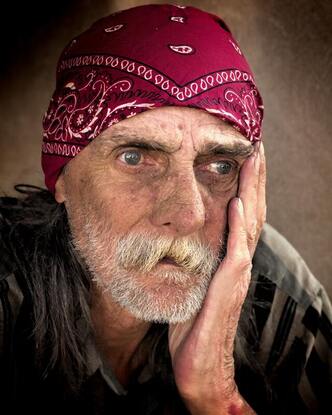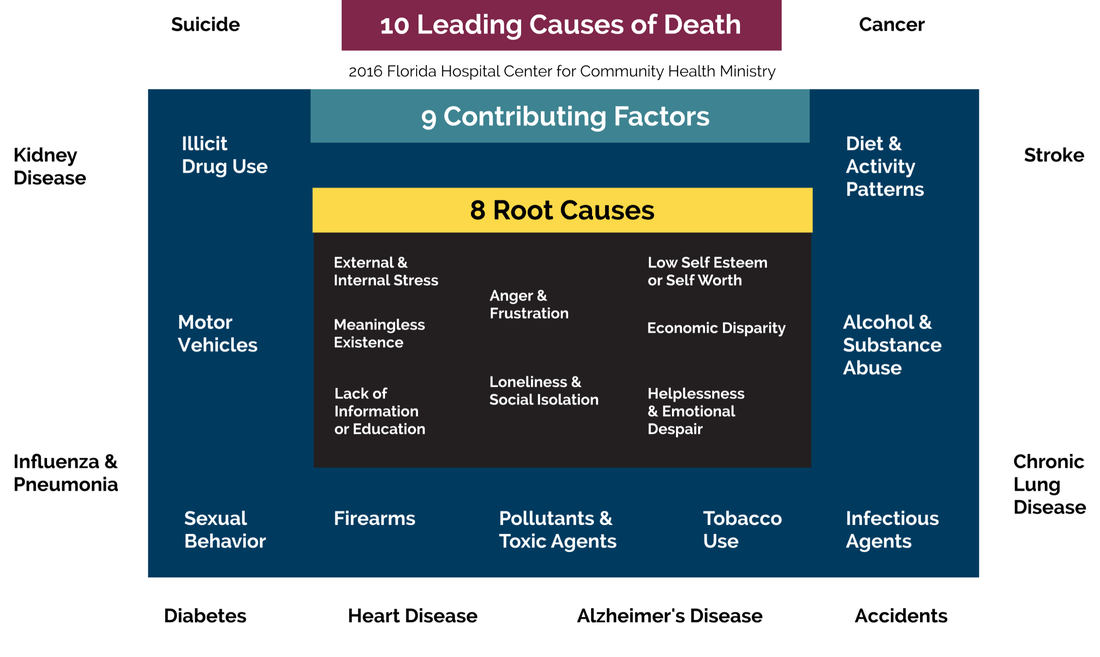Jamie Jean Schneider DommDigital Strategist, Social Media + Big Data, North American Division Engagers are at the front lines of mission and can serve as a powerful mechanism for community care. These empathetic individuals can operate within an organization or independently to engage in online conversations for the purpose of building meaningful relationships, understanding needs, and determining meaningful ways to serve others in both local and online communities. Every opportunity to connect is an opportunity to advance the kingdom of God. Let’s not waste our digital influence. Social media and digital tools provide a unique opportunity for continuous people care that can enhance and strengthen the relationships you cultivate with church members as well as with the community your ministry serves. Why do we need engagers? When we consider the roots of the ten leading causes of death (diagram below), we can see eight opportunities for the Church body to improve the well-being of others. These eight root causes—stress, a sense of meaningless existence, lack of information/education, anger and frustration, loneliness and social isolation, low self-esteem or self-worth, economic disparity, and helplessness and emotional despair—can be addressed through the corporate Church’s messages of hope and wholeness as well as the local church’s ability to directly meet the physical and emotional needs of people. The Curious Case of Roseto, PAA real-life example of the potential impact of addressing these root causes can be found in the book Outliers by Malcolm Gladwell. He begins the book with the story of an Italian immigrant town in Pennsylvania, whose population was made up entirely of Italians from Roseto, Italy. Due to prejudice, it was common for Italian communities during the early to mid-1900s to develop separately from the general population. The people of Roseto, PA smoked heavily, 41% of their calories came from fat, and many struggled with obesity. Yet they were able to avoid the main causes of death. An extensive study was done of this community, and the secret wasn’t diet, exercise, genes, or location. In fact, extended family living elsewhere in the United States did not enjoy the same low rates of disease. There was no suicide, no alcoholism, no drug addiction, and very little crime. They didn't have anyone on welfare. Then we looked at peptic ulcers. They didn't have any of those either. These people were dying of old age. That's it. My mother’s family is Sicilian, and I can personally attest to how extraordinary the health of this community was in comparison to that of other Italian-Americans. Italians in the United States tend to eat more meat, more dairy, fewer fresh vegetables, and less fruit than other Americans, and they favor white bread over whole grains; they also tend to suffer from chronic or severe heart issues. This is in sharp contrast to Italians living in Italy, whose health benefits greatly from a more plant-based, Mediterranean diet. However, growing up, we were taught to believe that Italians “just have bad hearts” and that we were genetically predisposed to have strokes and heart attacks. Recently, a man I had grown up with passed away suddenly at age 36. He appeared healthy, but his heart stopped while he was sleeping. Shock rippled through the Italian community followed by knowing nods of acceptance that it’s really not that uncommon among us. So, what is the difference between the Roseto community and the community I grew up in? When the researchers looked beyond the individual and started looking at health in terms of the community, they found something fascinating. Extended family clans formed the foundation of the town’s social structure. Three generations lived under one roof, people stopped on the street and talked, neighbors took care of neighbors, grandparents were respected, and the people of Roseto were unified through church and civic engagement. ...The Rosetans had created a powerful, protective social structure capable of insulating them from the pressures of the modern world. The Rosetans were healthy because of where they were from (paesani culture), because of the world they had created for themselves... —Malcolm Gladwell, Outliers In other words, they avoided illness because they had transported their communal, village way of living—embodied by the paesani culture of Italy—to their new home, whereas the Italian community of my childhood has become disconnected, individualized, and distant, only gathering together at the American Italian Society for major holidays. ...the values of the world we inhabit and the people we surround ourselves with have a profound effect on who we are. —Malcolm Gladwell To live out our faith and mission in the modern world, we have to be counter-cultural by striving to build healthy communities and support systems. While family and community structures have broken down, the Church, with some effort, can rebuild some of what has been lost to meet the physical, emotional, and spiritual needs of people. While the world has changed, people, fundamentally, have not. We still need each other. Digital tools and technologies offer a way to build meaningful relationships in a busy modern world. This takes empathetic and intentional people who can use their digital influence to uplift and connect with others.
12/19/2023 12:55:49 pm
I really loved reading your blog. It was very well authored and easy to undertand. Unlike additional blogs I have read which are really not tht good. I also found your posts very interesting. In fact after reading. I had to go show it to my friend and he ejoyed it as well! Comments are closed.
|
Archives
August 2020
Categories
All
|
- Home
- BLOG
-
RESOURCES
-
RESOURCE MENU
>
- ADVENTIST IDENTITY GUIDELINES
- BIG DATA RESOURCES
- BRANDING, IMAGE & DESIGN RESOURCES
- CHURCH/MINISTRY SPECIFIC RESOURCES
- COPYRIGHT & TRADEMARK BASICS
- COURSES
- EMAIL RESOURCES
- GUIDANCE FOR HIRING SOCIAL MEDIA POSITIONS
- PODCASTS
- REPORTS & CASE STUDIES
- SOCIAL MEDIA RESOURCES
- (SOCIAL) VIDEO RESOURCES >
- TEXTING 4 CHURCHES
- TRACKING & ANALTYICS
- WATCH VIDEOS & TUTORIALS
- WEBSITE TIPS
- SOCIAL MEDIA GUIDELINES
-
RESOURCE MENU
>
- SEO
- Digital Discipleship & Evangelism
- COVID-19 RESOURCES
- eNEWSLETTER



 RSS Feed
RSS Feed